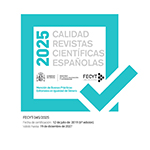Writings from a Sienese Renaissance prisoner. Antonio Petrucci’s fall and his zibaldone (1461-1465)
Resumen
Urbino. November 1464. Antonio Petrucci, a preeminent Senese politician and condottiero, is still imprisoned, following his defeat at the hands of papal troops on 30 October 1461. During his captivity, Petrucci composed a Zibaldone (a commonplace book), in which he mainly copied lyrics by Latin classics and Italian poets and humanists. Petrucci’s autograph also contains a complaint against Fortune dated 10 November 1464, which is one of the last texts of the manuscript. Petrucci was certainly
not the first medieval author to reflect on human fate and the role of Fortune. On the contrary, the image of the wheel of Fortune is probably among the most iconic of the Middle Ages. Nevertheless, Petrucci’s complaint is not simply a general reflection on the role of Fortune. The lamentation is chiefly the way Petrucci decided to portray his own personal fall, accusing the “very cruel Fortune” of depriving him of his “illustrious and gracious homeland”, Siena. It would be superficial to reduce the Senese’s complaint to a simple description of his misadventures, and the same is true for every document written by someone who suffered a failure. Petrucci’s case raises questions about the sources available to historians to study the history of downward mobility.
Descargas
Descarga artículo
Licencia
La revista En la España Medieval, para fomentar el intercambio global del conocimiento, facilita el acceso sin restricciones a sus contenidos desde el momento de su publicación en la presente edición electrónica, y por eso es una revista de acceso abierto. Los originales publicados en esta revista son propiedad de la Universidad Complutense de Madrid y es obligatorio citar su procedencia en cualquier reproducción total o parcial. Todos los contenidos se distribuyen bajo una licencia de uso y distribución Creative Commons Reconocimiento 4.0 (CC BY 4.0). Esta circunstancia ha de hacerse constar expresamente de esta forma cuando sea necesario. Puede consultar la versión informativa y el texto legal de la licencia.
La revista En la España Medieval no cobra por tasas por envío de trabajos, ni tampoco cuotas por la publicación de sus artículos.












